Pavel Durov, the founder of Telegram

Pavel Durov, the founder of Telegram, has recently been arrested in France as part of an investigation into alleged criminal activities on the Telegram platform and a lack of cooperation with law enforcement. Despite his arrest, Durov has not been charged with any crime, and Telegram has stated that he "has nothing to hide" regarding the allegations[1][2][3].
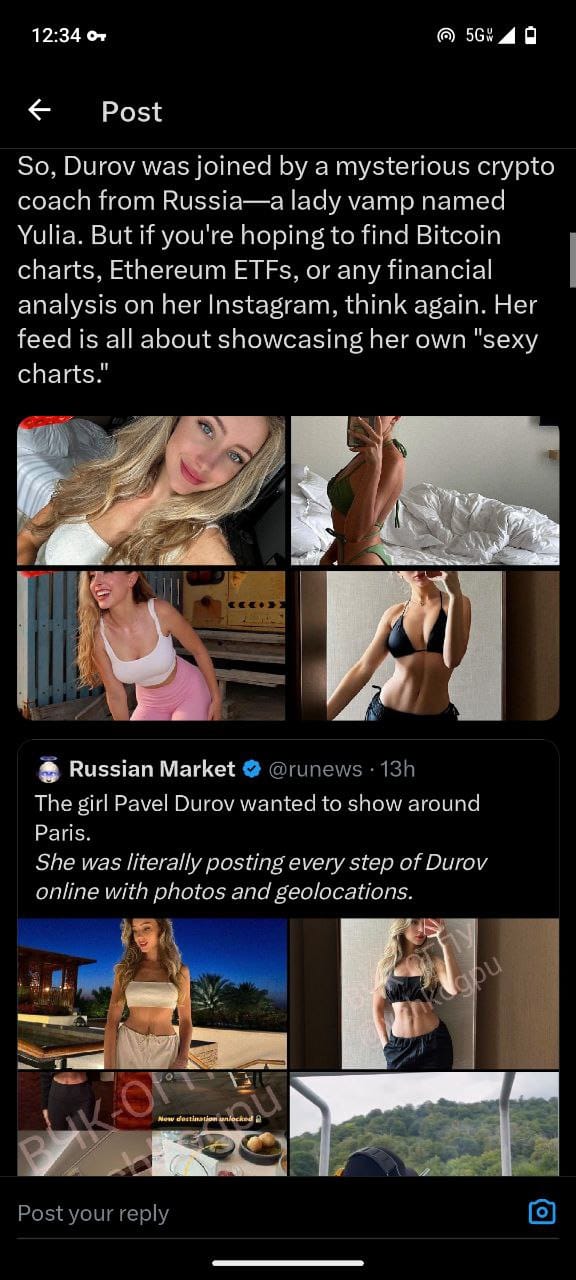
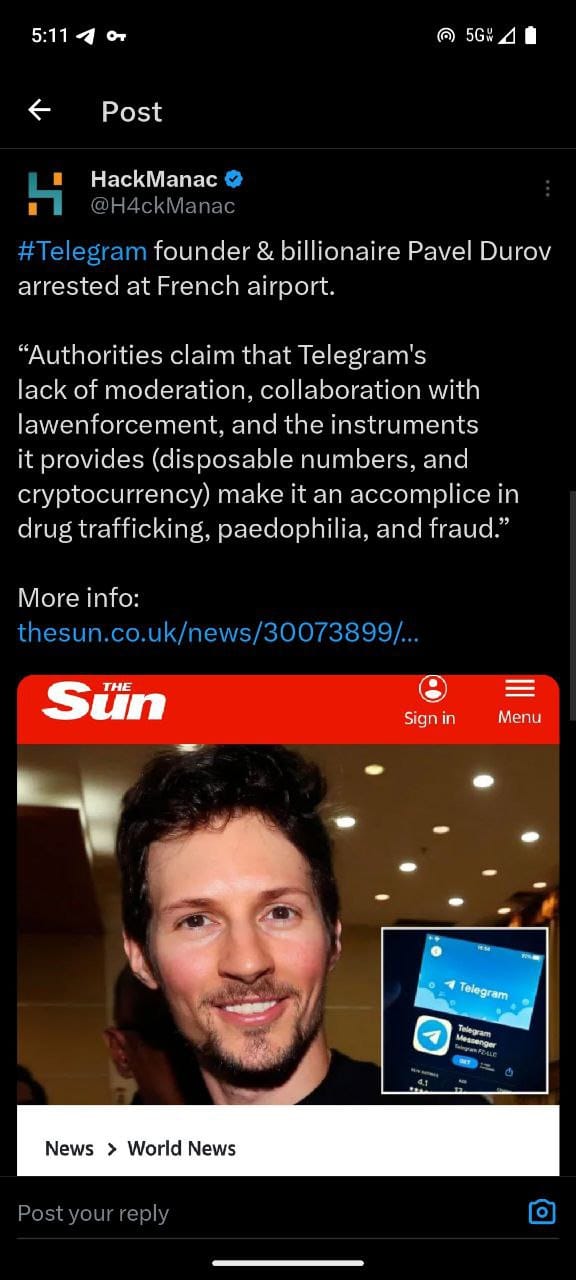
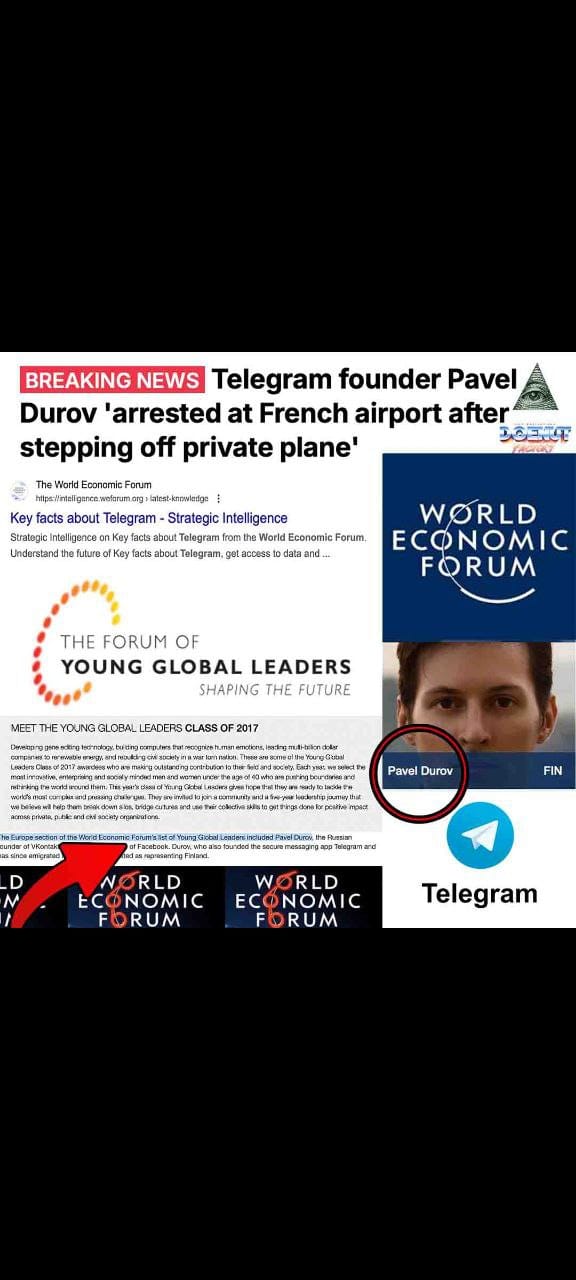
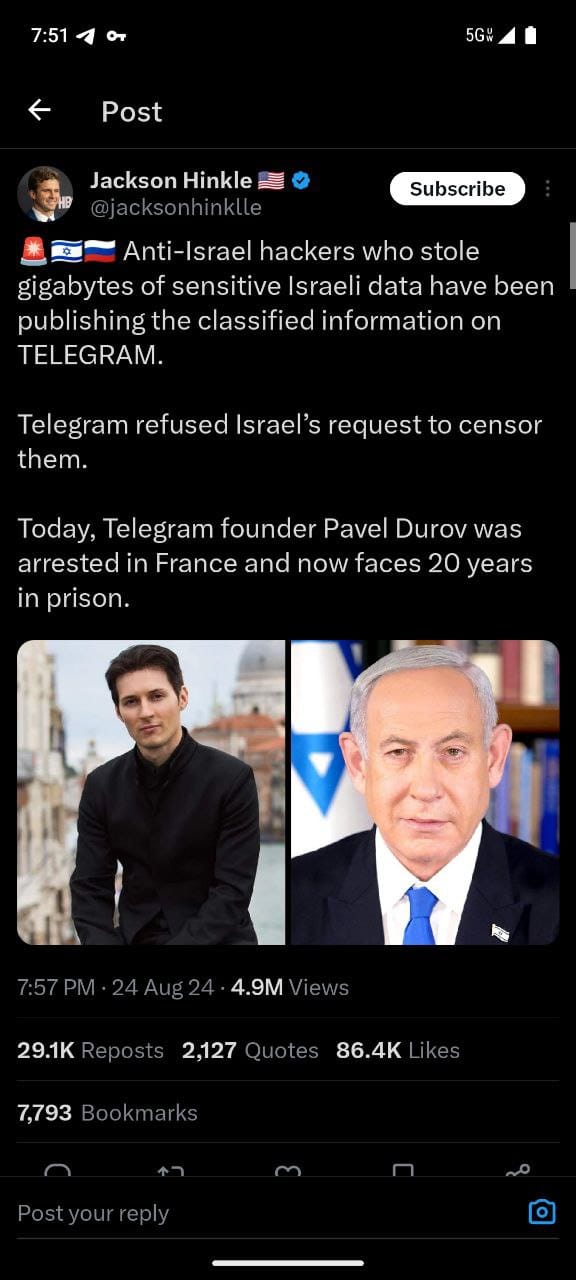
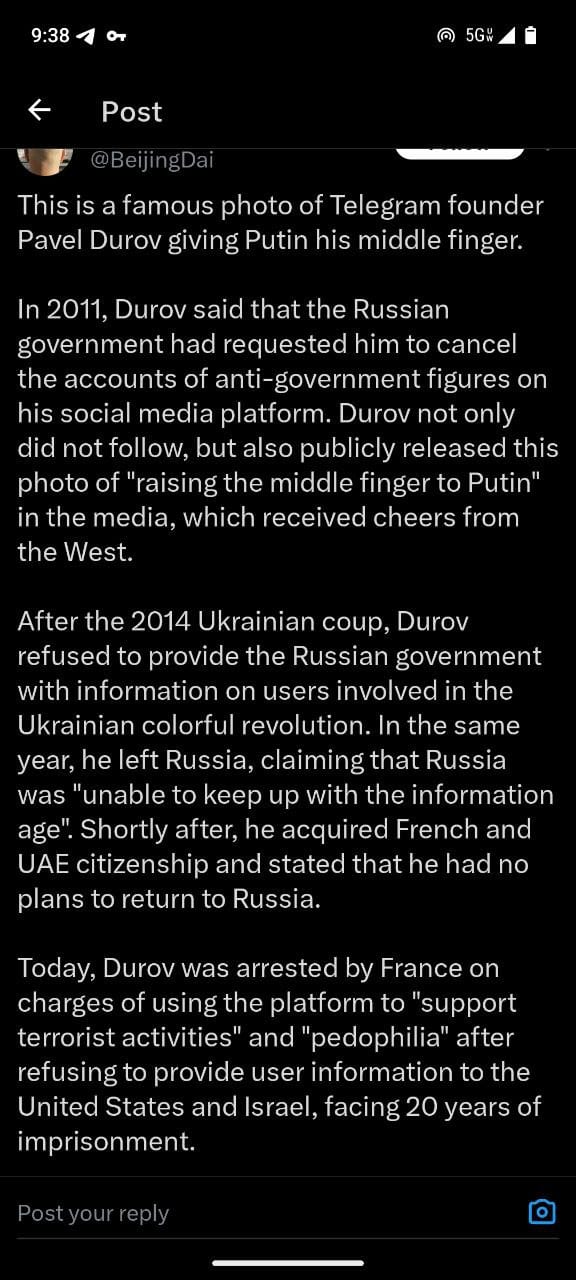
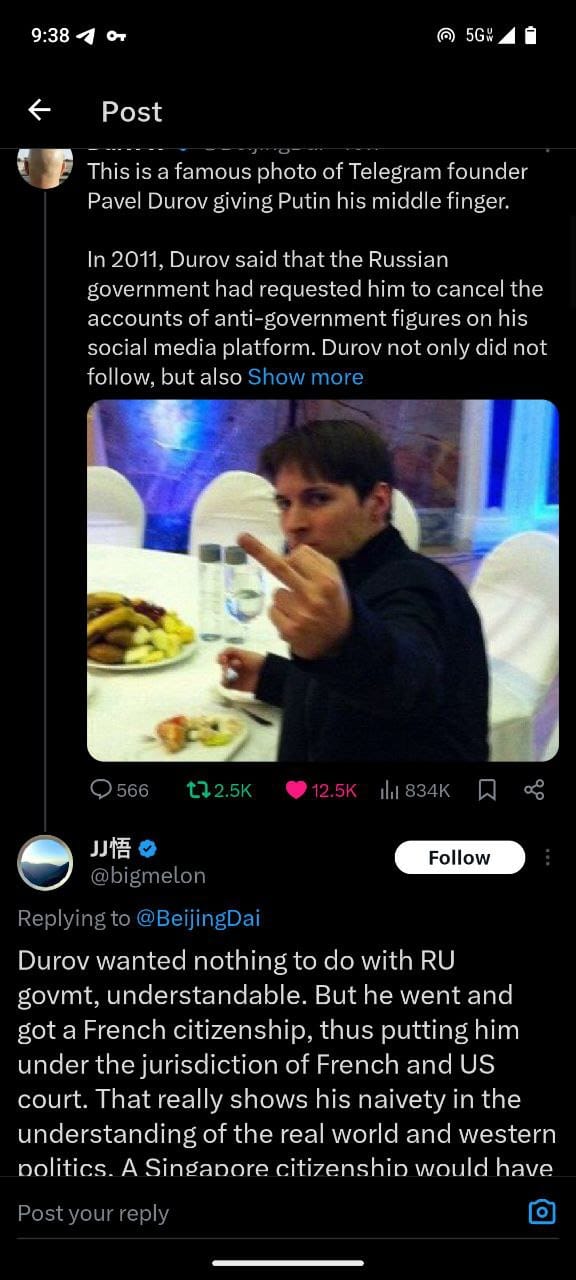
Background on Pavel Durov
Pavel Durov, born in 1984 in Russia, is a prominent tech entrepreneur known for founding VKontakte (VK), a leading social networking site in Russia, and later Telegram, an encrypted messaging app. His career has often been compared to that of Mark Zuckerberg due to his significant impact on social media in Russia[1][3].
Conflict with Russian Authorities
Durov's relationship with Russian authorities has been tumultuous. In 2011, he was pressured by the Russian government to remove opposition politicians from VK and provide access to private messaging data. In defiance, Durov posted a controversial image of himself giving the middle finger, which was interpreted as a bold statement against government interference[4]. This act, along with his refusal to comply with the government's demands, led to increasing pressure and eventual legal challenges, prompting him to leave Russia in 2014[7].
@cisomarketplace Behind the Scenes: U.S. Government's Interest in Telegram Discover the shocking reality of government scrutiny faced by privacy-focused platforms like Telegram. This video reveals firsthand experiences with FBI agents and their attempts to compromise security. Learn why privacy matters in today’s digital age. #Telegram #PrivacyMatters #USGovernment #FBI #CyberSecurity #TechNews #SocialMedia #BackdoorAccess #DataPrivacy #EngineerInsights
♬ original sound - CISOMarketplace
Global Recognition
In 2017, Durov was recognized as a Young Global Leader by the World Economic Forum, representing Finland. This accolade highlighted his influence and leadership in the tech industry[5][7]. Durov's work with Telegram has been particularly noted for its emphasis on privacy and resistance to censorship, making it a vital communication tool in politically sensitive regions[3][6].

Current Legal Issues
Durov's recent arrest in France is linked to allegations that Telegram has been used for illegal activities such as fraud, drug trafficking, and cyberbullying. The platform's strong encryption and limited content moderation have made it a target for criticism by various governments concerned about its potential misuse[1][3]. Despite these challenges, Telegram remains a key source of information, especially in conflict zones like Russia and Ukraine, where it is used by both government officials and opposition figures[6].
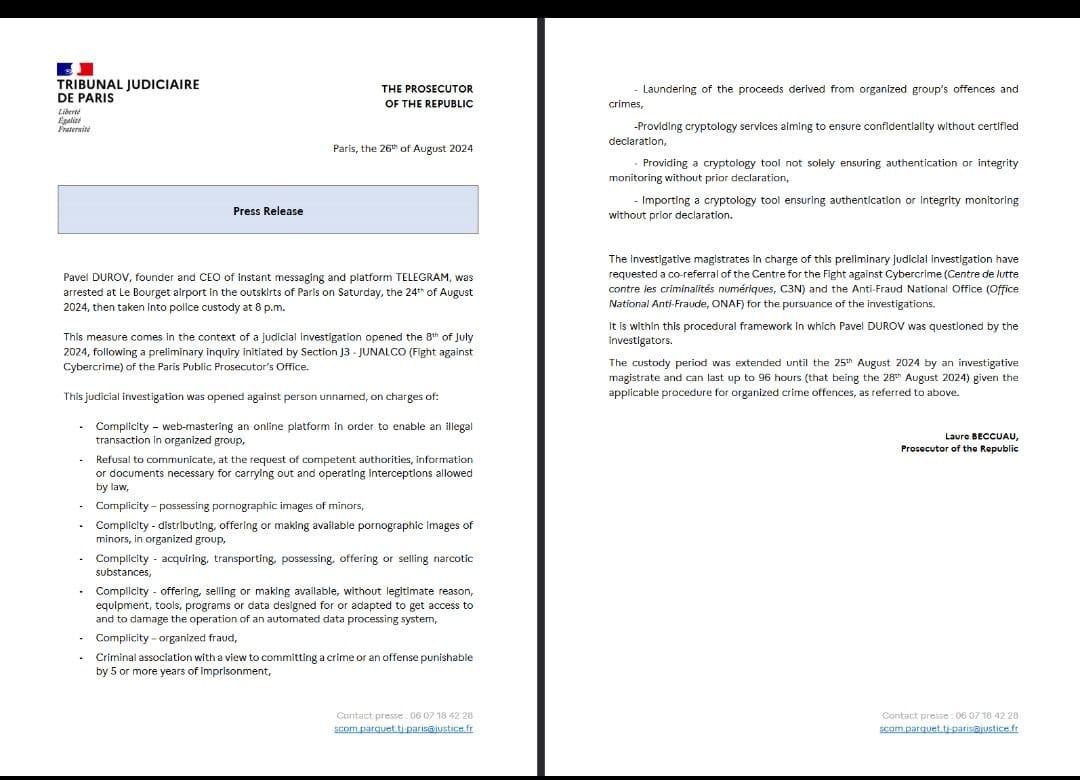
Tribunal Judiciaire de Paris regarding the arrest of Pavel Durov, the founder and CEO of the instant messaging platform Telegram. The document, dated August 26th, 2024, details the circumstances and charges leading to his arrest.
Key Points from the Press Release:
- Arrest Information:
- Pavel Durov was arrested at Le Bourget airport near Paris on August 24th, 2024, and taken into police custody at 8 p.m.
- The arrest is part of a judicial investigation that began on July 8th, 2024, initiated by Section J3 - JUNALCO (Fight against Cybercrime) of the Paris Public Prosecutor’s Office.
- Charges:
- The investigation has opened charges against an unnamed individual on several serious counts, including:
- Complicity in web-mastering an online platform to enable illegal transactions in an organized group.
- Refusal to communicate necessary information to competent authorities for carrying out interceptions allowed by law.
- Complicity in possessing and distributing pornographic images of minors within an organized group.
- Complicity in acquiring, transporting, and selling narcotic substances.
- Complicity in offering software or equipment designed or adapted for accessing automated data processing systems.
- Complicity in organized fraud.
- Criminal association with a view to committing a crime punishable by 5 or more years of imprisonment.
- The investigation has opened charges against an unnamed individual on several serious counts, including:
- Cryptology Offenses:
- The charges also include:
- Laundering proceeds from organized group offenses and crimes.
- Providing cryptology services to ensure confidentiality without proper certification.
- Importing cryptology tools that ensure authentication or integrity monitoring without proper declaration.
- The charges also include:
- Investigative and Legal Procedure:
- The investigation is being led by the Centre for the Fight against Cybercrime (C3N) and the Anti-Fraud National Office (ONAF).
- Durov was questioned within this procedural framework.
- His custody was extended until August 25th, 2024, and could last up to 96 hours, considering the procedures applicable for organized crime offenses.
- Authority:
- The press release is signed by Laure Beccuau, the Prosecutor of the Republic.
Analysis:
The document indicates that the French authorities have taken significant legal actions against Pavel Durov, tying him to a series of grave allegations, including complicity in organized crime, cybercrime, and other illicit activities. The involvement of high-level investigative bodies like C3N and ONAF suggests the seriousness of the investigation. The charges against Durov encompass a wide range of offenses, from cyber-related crimes to organized fraud, illustrating the complexity and breadth of the legal issues at hand.
This development could have significant implications for Telegram as a platform, considering the charges relate directly to the management and operations of the service. The legal proceedings and outcomes will likely be closely watched by the public and other entities concerned with cybersecurity, privacy, and internet governance.
Durov 100+ kids across the globe
In a surprising revelation, Durov has claimed to have fathered over 100 children through sperm donation. This began around 15 years ago when a friend approached him with a request to donate sperm due to fertility issues. Initially hesitant, Durov eventually agreed and became a regular donor, with his donations resulting in over 100 children across 12 countries. Although he stopped donating some years ago, his sperm continues to be used by IVF clinics around the world. Durov has expressed pride in contributing to addressing the shortage of healthy sperm donors and aims to destigmatize sperm donation, encouraging more healthy men to consider it as an option to help families struggling with infertility
Rumble CEO Chris Pavlovski Responds to France's Actions Against Telegram's Pavel Durov
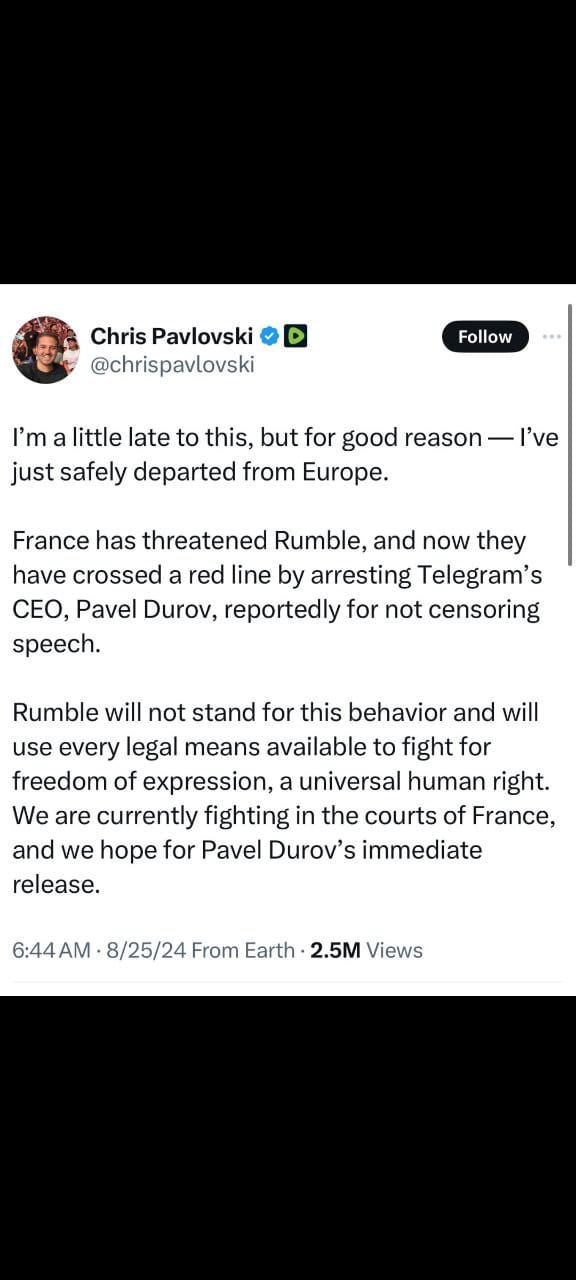
Chris Pavlovski, the CEO of Rumble, recently made headlines by announcing his safe departure from Europe after France reportedly took action against Telegram's CEO, Pavel Durov. Pavlovski's post on social media highlighted that Durov was allegedly arrested for refusing to censor speech on Telegram, a platform known for its strong stance on privacy and free expression.
In response, Pavlovski condemned the French government's actions, declaring that Rumble would use all available legal means to fight for freedom of expression, which he termed a "universal human right." He also revealed that Rumble is currently engaged in legal battles within the French courts and expressed hope for Durov's swift release.
This development underscores the growing tensions between tech platforms and governments over issues of censorship and free speech, with Rumble positioning itself as a staunch defender of digital rights.
These reactions from prominent figures highlight the tension between governments and platforms that prioritize free speech, with many expressing concern over what they see as an overreach by authorities to control information and limit freedom of expression.
- Chris Pavlovski: The CEO of Rumble, Chris Pavlovski, announced that he had safely departed Europe, reacting to the news that Telegram's CEO, Pavel Durov, was reportedly arrested in France for refusing to censor speech. Pavlovski condemned France's actions and vowed that Rumble would use all legal means to fight for freedom of expression.
- Andrew Tate: Andrew Tate tweeted that Pavel Durov was arrested in France for not censoring the "truth" on Telegram. He mentioned that potential charges against Durov include serious accusations like support for terrorism, drug trafficking, and more. Tate criticized these actions as an effort to control information everywhere.
- Warren Redlich: Warren Redlich questioned whether others were reconsidering travel to Europe after Durov’s arrest. He provided context, noting that Durov left Russia in 2014 to avoid similar pressures and highlighting that French authorities focused on Telegram's lack of content moderation, which allegedly allowed criminal activities to go undetected.
- Elon Musk: Elon Musk responded to the news by asserting that America is the last large country to uphold free speech, though he noted that even in the U.S., free speech is under attack.
- Edward Snowden: Edward Snowden expressed his dismay over Durov's arrest, calling it an assault on basic human rights like speech and association. He criticized France's actions, implying they were tantamount to taking hostages to gain access to private communications.
- Marjorie Taylor Greene: Marjorie Taylor Greene declared that free speech is under attack globally. She questioned why opinions and voices are considered such a threat and called for resolving differences openly in the public square.
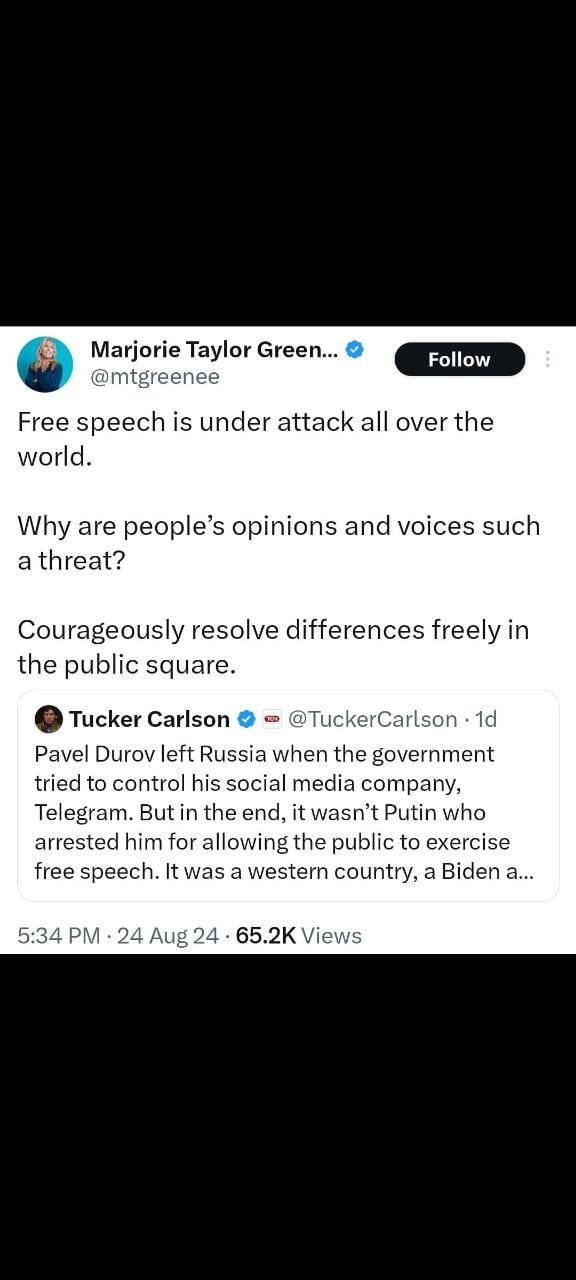
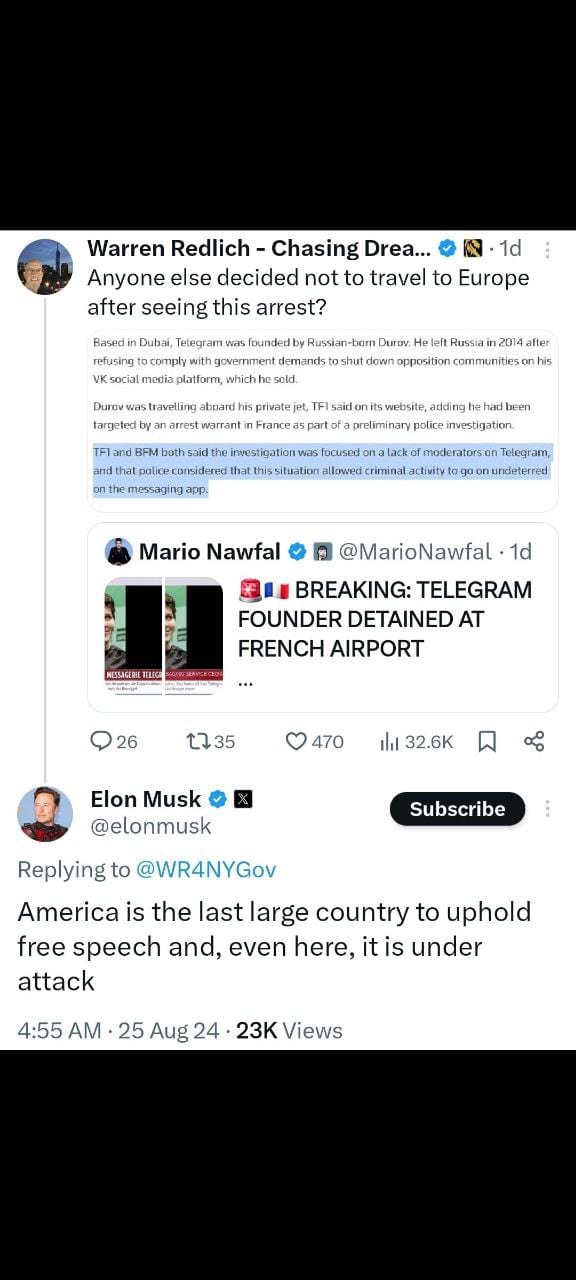
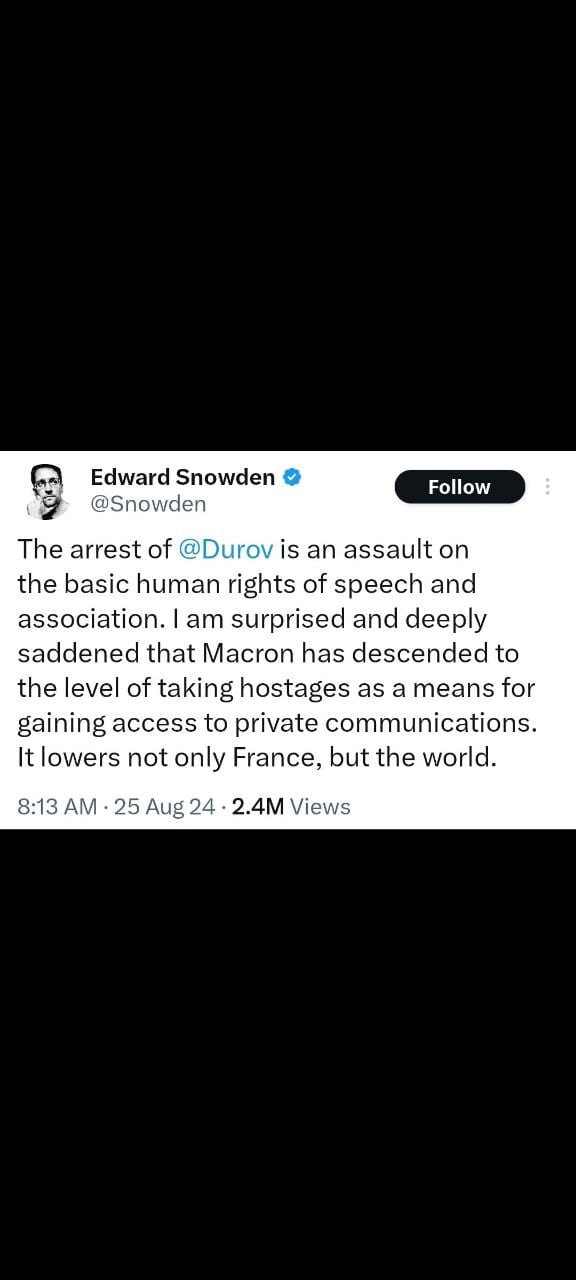
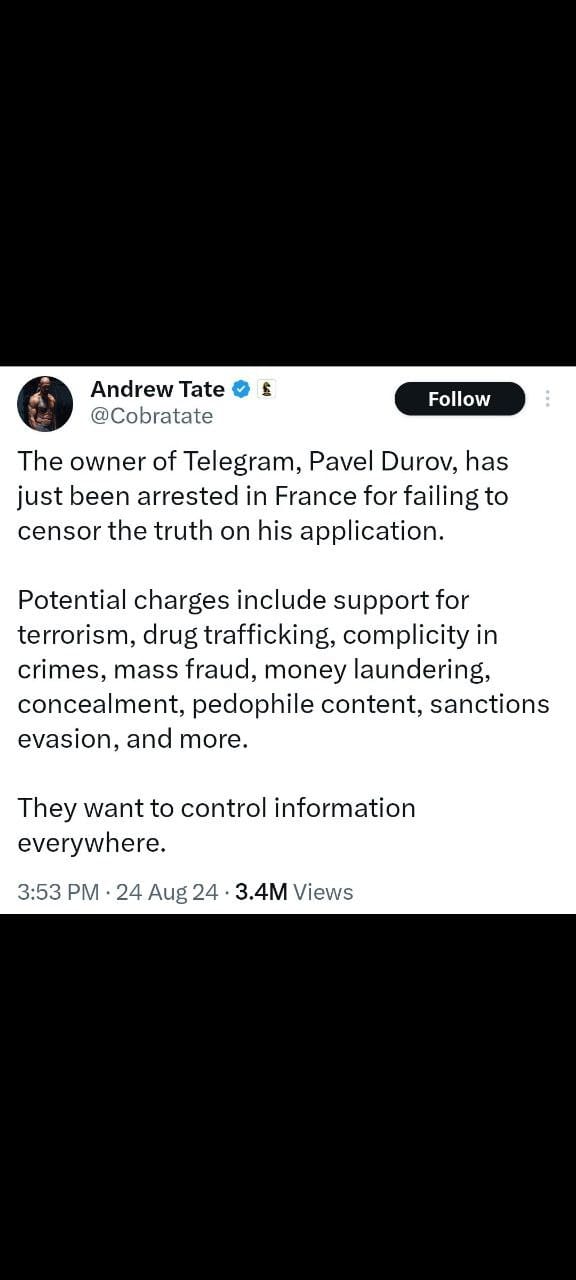

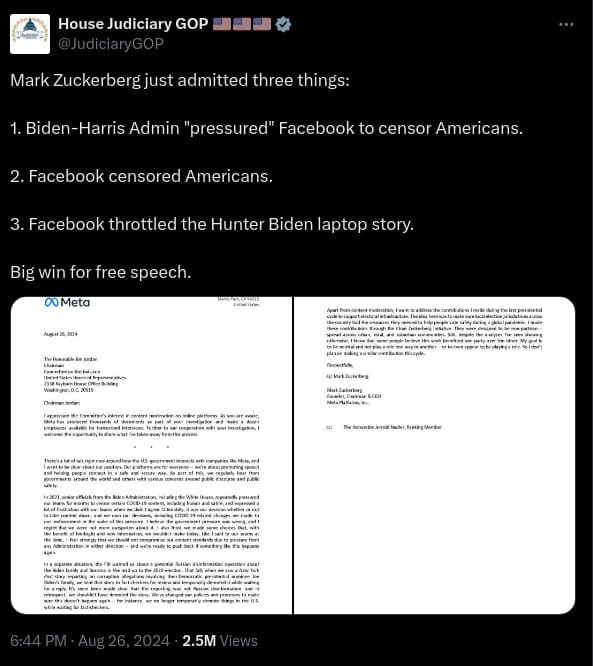
Russia’s Ban on Signal and WhatsApp: A Surge in Telegram Usage Amid Privacy Concerns
In a significant move, Russia has recently banned the use of Signal, a popular encrypted messaging app, and designated WhatsApp, owned by Meta, as an "extremist organization." This action has driven many Russians to migrate to Telegram, an app developed by Russian-born tech entrepreneur Pavel Durov. However, this shift raises substantial concerns, as Telegram is a NON-encrypted messaging platform that reportedly includes a government-style, undocumented Data Exfiltration API.

The Ban on Signal and WhatsApp
The ban on Signal and the labeling of WhatsApp as an extremist organization appear to be part of a broader effort by the Russian government to control digital communication and information flow within the country. Signal is known for its robust end-to-end encryption, which ensures that only the communicating users can read the messages. WhatsApp also offers encryption, although its association with Meta, a company frequently criticized by Russian authorities, has made it a target for censorship.
Telegram’s Rise and Its Privacy Risks
With Signal banned and WhatsApp under the extremist label, many Russians have turned to Telegram as their primary messaging platform. Despite being developed by Durov, who left Russia due to government pressure, Telegram’s popularity within Russia has surged. However, this comes with a significant caveat: Telegram is not an end-to-end encrypted messaging app by default, which means that the communications are potentially accessible to third parties.
Furthermore, there have been reports, including from sources like THC’s blog, suggesting that Telegram has a government-style, undocumented Data Exfiltration API. This means that while the platform is widely perceived as secure and private, it may actually allow for data to be accessed and extracted by government agencies or other entities without users' knowledge. This paradoxical situation raises concerns about the real motivations behind the Russian government's tolerance for Telegram, as opposed to other encrypted apps like Signal.
The Irony of the Situation
The irony of the situation is stark. Russians, in search of privacy and security in their communications, are flocking to a platform that, despite its reputation, may actually compromise their data. The move away from apps like Signal, which truly offer encrypted communication, to Telegram, which might be vulnerable to government surveillance, underscores the complexity and challenges of digital privacy in authoritarian regimes.
Conclusion
As Russia continues its crackdown on encrypted messaging platforms, the shift to Telegram among its citizens highlights a troubling trend where perceived security does not necessarily equate to real privacy. Users may be inadvertently exposing their data to the very government surveillance they seek to avoid. The situation also raises broader questions about the role of government in regulating digital communication and the responsibilities of tech companies in protecting user data. As more details emerge, particularly about Telegram's alleged Data Exfiltration API, the debate over digital privacy in Russia and other authoritarian states is likely to intensify.
For further details on these developments, you can refer to the THC blog post.
"No Guarantee of Free Speech" - Tim Walz
“No guarantee of free speech” - Walzpic.twitter.com/6JIHD5RWgW
— Elon Musk (@elonmusk) August 25, 2024

In summary, Pavel Durov's journey from a tech innovator in Russia to a global figure in digital privacy and communication has been marked by significant achievements and controversies. His recent arrest underscores ongoing tensions between tech companies and regulatory authorities over issues of privacy and security.
Citations:
[1] https://www.aljazeera.com/news/2024/8/26/who-is-telegram-founder-pavel-durov-all-to-know-about-his-arrest-in-france
[2] https://www.cnn.com/2024/08/26/tech/pavel-durov-telegram-profile-intl/index.html
[3] https://www.theguardian.com/media/article/2024/aug/26/who-is-pavel-durov-billionaire-founder-telegram-mysterious-figure
[4] https://vocal.media/01/why-the-russian-founder-of-telegram-gave-putin-the-middle-finger
[5] https://simple.wikipedia.org/wiki/Pavel_Durov
[6] https://www.themoscowtimes.com/2024/08/26/why-pavel-durovs-detention-shook-both-the-russian-opposition-and-putins-regime-a86147
[7] https://en.wikipedia.org/wiki/Pavel_Durov






